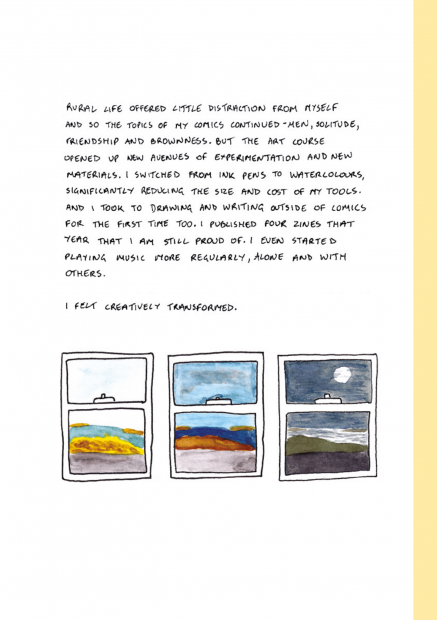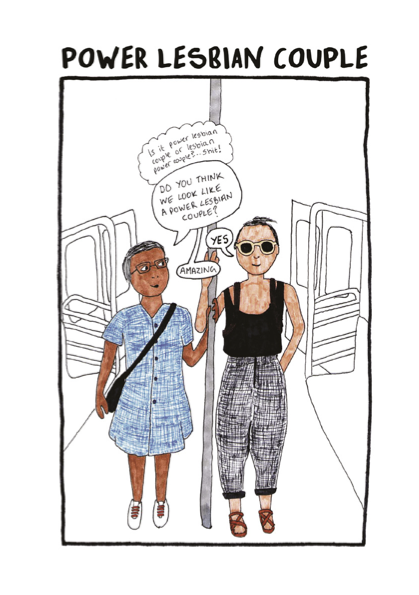Review: FML Comics: Collected 2016-2020 (Good Comics)
‘FML Comics’ is an autobiographical collection of comic strips from artist and writer Natasha Natarajan. As she anecdotally navigates her way through relatable problems with self-esteem, mental health and personal growth between the period of 2016-2020, Natarajan finds herself developing as both a writer and artist, and as a person.
 Publisher: Good Comics
Publisher: Good Comics
Writer: Natasha Natarajan
Artist: Natasha Natarajan
Price: £10 from Good Comics
As its abbreviated name would suggest, FML Comics (short for F**k My Life) is a completely non-censored autobiography, which looks into the mind of a 20-something British-Indian woman, author-surrogate Natasha, navigating her way through modern day issues. Through heartbreak and hilarity, author Natasha Natarajan draws comic panels about her day-to-day life, and is completely honest about her experiences, whether that be with the comic book sector, polyamorous relationships, or periods. Nothing is off limits for Natarajan or her counterpart. By compiling comic strips written between the period of 2016-2020, we get to see Natasha as a character mature and evolve up until the present-day pandemic, as well as seeing the author Natarajan develop stylistically as a cartoonist.
There is no storyline as such to this comic, just noteworthy thoughts or anecdotes that Natarajan writes and illustrates. FML’s stylistic set up remains consistent throughout: a page or two of hand-sketched drawings in comic strip style, generally depicting a certain issue the protagonist is having. In the first part of FML, the panels generally finish with the word f*** as the punchline to a joke (which we assume influenced the title of the collection!). We really enjoyed watching Natarajan’s writing prowess grow, as her later comic strips relied more on the build up to the joke, more so than the exclamation at the end of it. We also appreciate how, as Natarajan grew as an artist and writer, she was able to concentrate on more serious themes as well as funny ones, like body issues, racism, and libido – a lot of the content was especially relatable to women in the 21st century.
One of our favourite stylistic choices made throughout were the pages of text which separated the years (or chapters) from each other. It made a nice change in formatting from the short comic strips and offered an aspect of continuity in Natarajan’s story which could have been lost among the humorous stand-alone panels which focus on isolated incidents. In the few pages focused solely on writing, Natarajan often turn more serious in tone, as she shares personal worries about her life, like how she feels about comics and publishing. Through these pages, it was wonderful to read about Natarajan’s evolution into becoming a published author: from printing and stapling together her zines to sell at a concert in 2016, to her first experience of a zine fair, and then her eventual decision to study art and design in Scotland.
The panels which evoked Natasha’s experience of being in Scotland were some of the most thoughtful in the book. She really seems to get in touch with nature and begin to evolve as a person to meet her own wants and needs and begins to distinguish realism and fantasy. This is especially poignant after the breakdown of her seven-year relationship, her moving away from home for the first time, and feeling totally directionless.
We will give a brief disclaimer: a lot of the jokes involve swearing or sexual content, and if that isn’t your kind of humour or something you’re comfortable with, you may want to avoid this one (or just skip those particular scenes!). However, Natarajan really shines through the dry, self-deprecating humour that is prevalent all the way through. One funny aspect that particularly stood out were the interesting name choices she gives to side characters throughout FML: Natasha encounters Cool Sound Engineer Guy, The Perfect Butch, and our personal favourite, Almond Flour Brownies Guy (his tattoos are so cool!). The fact that Natasha often knows these people quite intimately makes the nicknames pretty comical and showcases perfectly the hilarity of her insouciant attitude.
A stand-out moment is the ending, which doesn’t finish with a typical ‘happily ever after’ as the beginning of the pandemic hits. We thought it was uncommonly sincere about how life is imperfect and messy, but well worth living.





